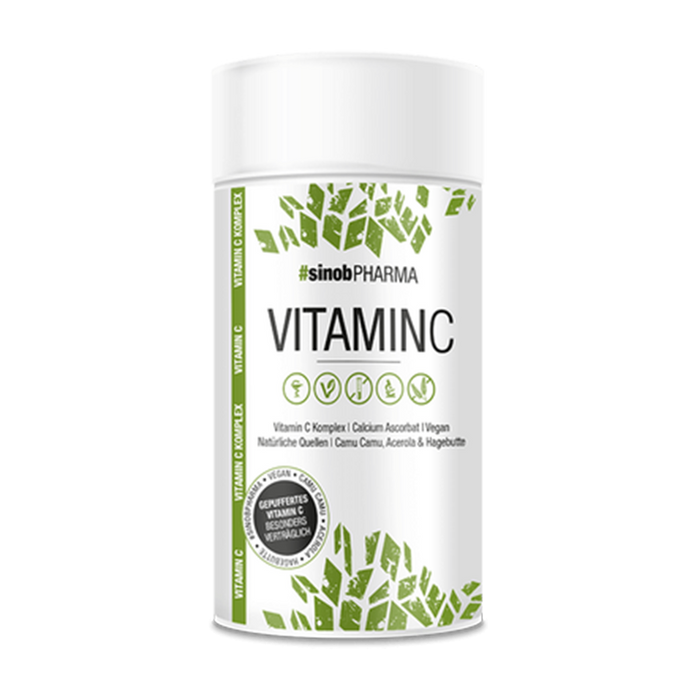Possibly the best vitamin C capsules on the market Our vitamin C capsules are truly remarkable. In addition to calcium ascorbate, a particularly well-tolerated and buffered form of vitamin C, we have also added camu camu extract, rosehip extract and acerola powder - the best natural sources of vitamin C that nature has to offer.
Why is vitamin C important anyway? Your body cannot produce vitamin C itself, so you need to get it from your diet. Vitamin C is an antioxidant and plays a crucial role in the production of collagen, an important protein in connective tissue. It is also important for the formation of cartilage and bone tissue.
How much vitamin C should you take daily? Normal, healthy people who do not exercise do not usually need to take extra vitamin C. Since you are on our website, you are probably one of those people who are interested in sports and nutrition. In this case, some different rules apply:
The recommended daily intake for vitamin C is usually between 100-200mg and can be achieved through a balanced diet. However, for athletes or during times of colds, the requirement may be higher - up to 2,000mg (2g) per day. Such an amount is difficult to cover with food alone. Here is a small table with the vitamin C content per 100g of different foods:
- Camu Camu: 2000mg
- Acerola cherry: 1300-1700mg
- Rosehip: 1250mg
- Sea buckthorn: 200-800mg
- Apple: 12mg
- Lemon: 50mg
- Red bell pepper: 140mg
- Kiwi (depending on ripeness): 200-300mg
- Orange: 50mg
- Brussels sprouts: 110mg
To get 100-200mg of vitamin C, you would need to eat the following:
- About 4-7 apples
- 1-2 peppers
- 1/2 - 1 kiwi
- 2-4 lemons
- Or a mixture of different foods. To summarize, it is possible to cover the requirement through a conscious and balanced diet.
But when it comes to increasing the requirement to 2000mg per day:
- Approximately 150 apples
- 1.4 kg of peppers
- 4 kg of lemons
- That will probably be difficult to implement ;)
As you can see, it is no longer realistic to cover your vitamin C requirements with food alone at higher doses. This is where food supplements come into play, but only if absolutely necessary. You should always try to get your nutrients through a balanced diet.
The ideal vitamin C blend We use the best natural sources of vitamin C in our vitamin C capsules from #sinob Pharmaline:
- Calcium ascorbate
- Camu-Camu
- Acerola cherry
- Rosehip
These natural sources of vitamin C not only have the highest natural vitamin C content, but also contain many phytochemicals. Your body does not recognize any difference between ascorbic acid (vitamin C) from different sources. What counts are the additional phytochemicals found in natural sources of vitamin C. These phytochemicals improve the absorption of vitamin C in your body. This is the main reason why we have included natural sources of vitamin C in our vitamin C capsules.
Vitamin C in buffered and stomach-friendly form as calcium ascorbate Calcium ascorbate
Our #sinob PHARMA Line uses only high-quality raw materials. That is why we have opted for calcium ascorbate instead of simple ascorbic acid. Simple ascorbic acid, which is used in most vitamin C products, can cause stomach problems such as diarrhea, heartburn and stomach pain at higher doses. Calcium ascorbate, on the other hand, is acid-free and very well tolerated, even at higher doses. It has no effect on the pH value of your stomach acid.
Camu camu Have you heard of camu camu? If not, no problem! Even the indigenous people of the Amazon region, where this shrub grows, initially found the fruit inedible due to its extreme acidity. Only recently have researchers discovered that camu camu has the highest natural vitamin C content of all fruits.
Acerola cherry The acerola cherry, also from South America, is somewhat better known than camu camu and ranks second in terms of natural vitamin C content in food. However, it differs considerably from our native cherries. As these cherries are very delicate, they are rarely seen in Germany. Acerola cherries are usually found in the form of powder, jam or drinks.
Rose hips Last but not least, rose hips and their fruits. Rosehips have the third highest natural vitamin C content in the world. Unfortunately, a lot of vitamin C is lost during cooking, which is why rosehip jam no longer contains 1250mg of vitamin C, but only 50mg. This is why we have opted for a high-quality extract.


